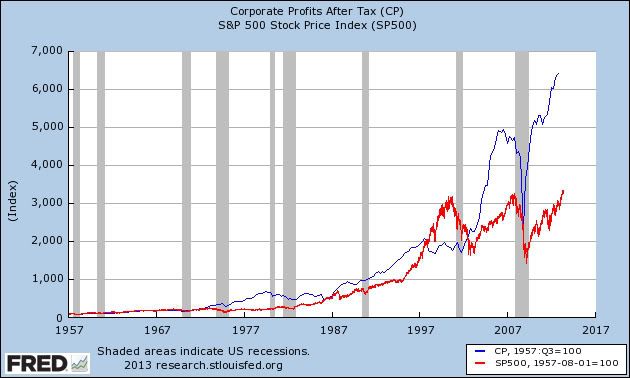. - by New Deal democrat
Lately I've just been ignoring the Doomers. They've been so wrong for so long that it just isn't worth the time to debunk their periodic Pastisches of Pessimism (tm) in which they prove that they can string together a random assemblage of graphs going down. The canard that the stock market has become divorced from reality, though, has recently been bubbling up in the fevered Doomer imagination in multiple places and hasn't been given a good spanking, so I guess it's time for a little intellectual discipline.
The stock market is and has been for decades one of the components of the Leading Economic Indicators. It isn't perfect - no indicator is - but it almost always makes a peak and a trough, respectively, before the economy as a whole. For example, most recently it peaked in early Ocober 2007 and bottomed in March 2009 2 months and 3 months, respectively, before the economy as a whole.
In the last couple of months, the stock market has made new highs while the economy has been just shambling along, and consumer savings have been stretched to make up for the payroll tax increase. Why is that?
To simplify - actually oversimplifying some - investors in the stock market in the aggregate try to measure the near term outlook for the profitability of the companies in which they trade. the belief is that if profits go up, so will the stock price and in some cases the dividends paid as well.
And boy, have profits gone up! The below graph compares corporate profits after tax (blue) with the S & P 500 stock index (red), with both normed to a value of 100 in 1957:

Let's start with the 1987 stock market crash. Notice in the graph that the crash brought profits and stock prices right back in line to their 1957 parity. Then for 10 years corporate profits.boomed, even moreso than the stock market. But beginning in 1997 the stock market entered a bubble, where corporate profits leveled off and even declined slightly, but the stock market continued to boom with the dot com craze.
Notice that since the ensuing crash, stock prices, while broadly correlating with corporate profits, never again reached parity with their 1957 level. Rather, since March 2009 the stock market has gained about 125% - and so have corporate profits, which by far are at all time highs, and have been at new highs for almost three years.
Another way to measure this is to look at the p/e or price-to-earnings ratio. This measures how much buyers of stock are willing to pay for a dollar of earnings (a good layperson's comparison is to think of how much a home buyer is willing to pay per square foot of a house. The higher the price per square foot, the more expensive the house). One year ago, the Dow Jones Industrials had a p/e of 14.68. They ended last week at 15.73. This is not much above their long term average. By contrast, in 1929 their p/e was over 18 and at the height of the dot com bubble it was over 20.
So could the stock market decline tomorrow? Of course! But it's worth noting that in the graph above you can see that corporate profits (the blue line) tend to peak well before stock prices (the red line). In fact corporate profits are a recognized long leading indicator, which means they usually peak at least a year before the economy as a whole.
None of anything I've said above is cheer leading for the economy. Corporate profits may be booming, but real wages actually declined in the last couple of years. They've rebounded in the last couple of months, but as I pointed out yesterday, we now have the lowest personal savings rate since before the 2008 recession.
So while stock prices are firmly in line with the reality of corporate profit growth, they don't measure what is happening with wages and income for average Americans. In fact the biggest economic problem is precisely that those productivity gains are barely being shared with workers at all.
If my word isn't good enough for you, maybe you should point the Doomers to this highly recommended Daily Kos diary by Ministry of Truth from three weeks ago, the title of which is Corporate profits just hit an all time high BECAUSE wages just hit an all time low. That diary isn't incorrect at all. The stock market's problem isn't that it is divorced from reality. It is that it is reflecting reality all too well.